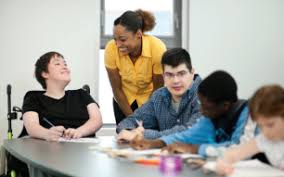Pre-Employment Transition Services (Pre-ETS)

At WES, Pre-Employment Transition Services (Pre-ETS) are provided to transitioning individuals who meet the definition of a "student with a disability." as required of the state of Texas. Federal regulations at 34 CFR 361.5(51) define a "student with a disability" as:
- Federal regulations at 34 CFR 361.5(51) define a "student with a disability" as:
" . . . an individual with a disability in a secondary, postsecondary, or other recognized education program who -
(A)(1) Is not younger than the earliest age for the provision of transition services under section 614(d)(1)(A)(i)(VIII) of the Individuals with Disabilities Education Act (20 U.S.C. 1414(d)(1)(A)(i)(VIII)); or
(2) If the State involved elects to use a lower minimum age for receipt of pre-employment transition services under this Act, is not younger than that minimum age; and
(B)(1) Is not older than 21 years of age; or
(2) If the State law for the State provides for a higher maximum age for receipt of services under the Individuals with Disabilities Education Act (20 U.S.C. 1400 et seq.), is not older than that maximum age; and
(C)(1) Is eligible for, and receiving, special education or related services under Part B of the Individuals with Disabilities Education Act (20 U.S.C. 1411 et seq.); or
(2) Is a student who is an individual with a disability, for purposes of section 504."
In Texas, the relevant age range is 14–22 years old.
What does Pre-ETS focus on?
Examples of Pre-ETS Services?
|
Pre-ETS at WES focuses on the following:
Do the extensive detail of information about work readiness services, receive more information by scheduling an appointment to meet with one of our Program Coordinators by completing our contact information form below. All appointments are scheduled as soon as your request is received.
|
|
See if you qualify for Pre-ETS

